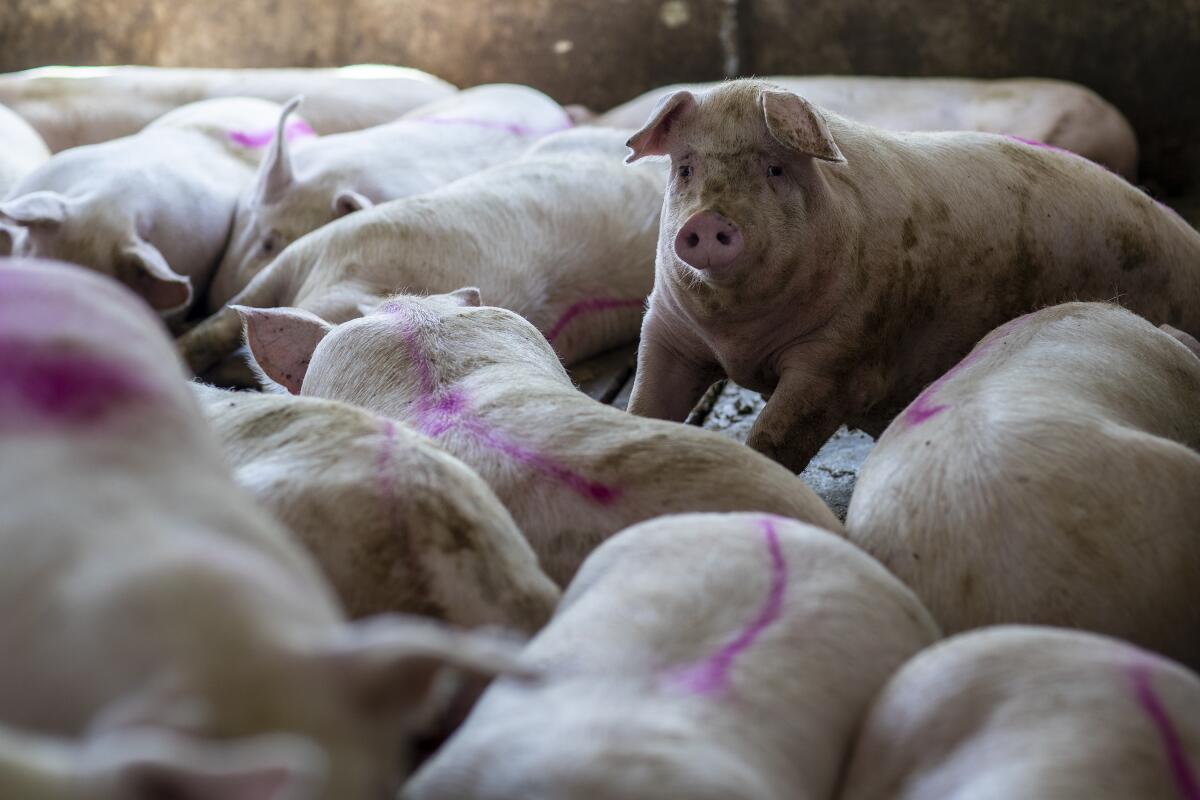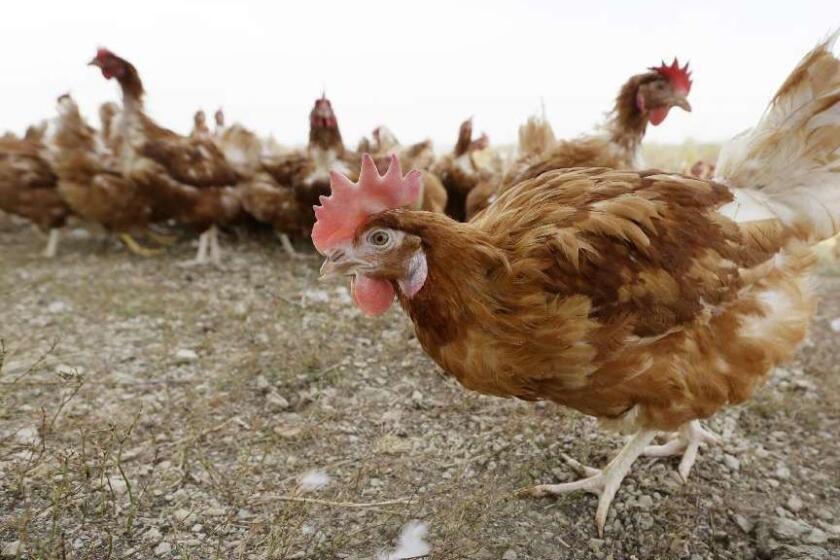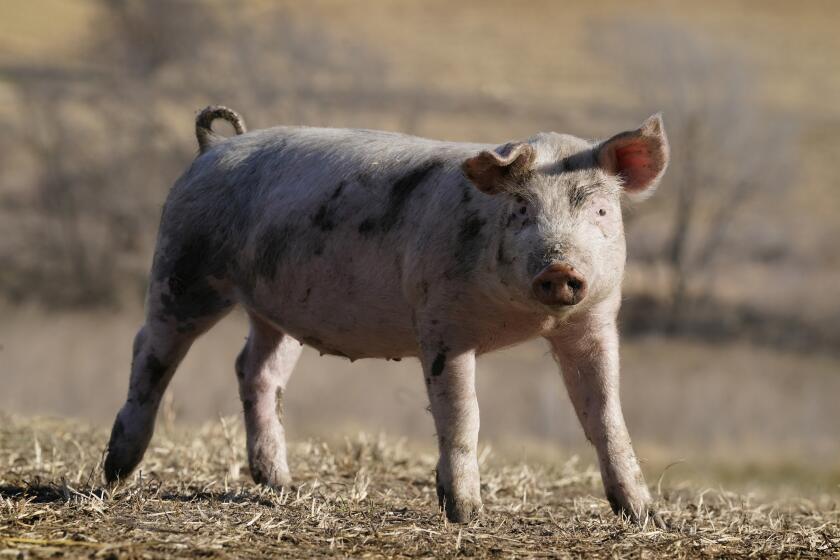The Supreme Court shouldn’t meddle with California’s standards on meat and eggs

- Share via
On industrial pig farms in the United States, mother pigs are confined for their entire lives in barren cages barely larger than their bodies. In these “gestation crates,” these intelligent animals are tortured. They cannot turn around or even fully lie down, causing them to develop painful sores and cramped muscles. Their piglets are born into a densely packed environment ripe for disease and infection.
For years, the majority of calves raised for veal and hens raised to produce eggs suffered lives of similar deprivation. Medical research shows that such confinement threatens the health and safety of consumers by compromising the animals’ immune systems and facilitating the transmission of disease-causing pathogens from the slaughtered creatures to humans. It’s almost as though their suffering can be turned into a perversely poetic punishment for their human tormentors.
No wonder the people of California in 2018 overwhelmingly approved Proposition 12, the Prevention of Cruelty to Farm Animals Act, which bans the extreme confinement of mother pigs, calves raised for veal, and egg-laying hens, and prohibits the in-state sale of pork, veal and eggs produced with such cruel farming methods.
By setting a standard for products sold in the California market — a standard to which all in-state and out-of-state producers must adhere — California acted in the best tradition of states as laboratories of democracy, adopting requirements that other states might then emulate and that might eventually be adopted by Congress as a nationwide requirement. So far, six states have passed similar legislation, following California’s lead, just as California had followed that of Massachusetts.
What constitutes the proper and ethical treatment of animals has evolved substantially over the last few decades and, inevitably, will continue to change as people better understand the animals that share our homes as pets, roam outdoors as wild creatures, or end up as food on our plates.
The pork industry challenged the California law, claiming it violates the Constitution’s Commerce Clause because it improperly regulates interstate commerce. The federal district court and the 9th Circuit Court of Appeals rejected this argument. But the Supreme Court took the case, National Pork Producers Council vs. Ross, and will hear oral arguments Tuesday.
Under long-standing legal principles, states are free to adopt reasonable rules to regulate what may be sold to people in those states — including how the goods are produced — as long as the regulations don’t discriminate against out-of-state products or irrationally burden interstate commerce.
Accordingly, courts have upheld a Maryland restriction on in-state gasoline sales, which affected some refineries’ out-of-state operations; a Kentucky price-gouging law whose application to online sales was alleged to affect out-of-state pricing of goods; and a Colorado statute requiring that 20% of electricity sold to Colorado consumers come from renewable sources, regardless of where it was produced.
It makes good sense for California to require out-of-state businesses that want to sell their meat products there to comply with the same standards as businesses in California. Exempting out-of-staters could give them an unfair cost advantage. Besides, Californians should have every right to recognize that a pig or a chicken tortured in Iowa or Missouri suffers no less than a pig or chicken tortured in California — and that food produced by inhumane methods, regardless of where it was produced, could infect Californians with foodborne illness.
Of course, agribusinesses would like to see laws like Proposition 12 struck down as another way to deregulate markets and strip government of powers to protect the public’s health and safety. And they are hoping the Supreme Court, which at times has proved particularly receptive to business interests, will do exactly that.
If this case were about economic protectionism, there would be a good case for Supreme Court intervention. But the California law doesn’t give an advantage to in-state businesses. And it doesn’t impose a burden on interstate activities that outweigh the benefits to the state’s residents.
A California ballot measure that required all pork sold in the state to meet certain welfare standards was supposed to take effect this year.
If the Supreme Court adopts the position advocated by the pork producers, the number and variety of state laws that might end up on the chopping block would be hard to estimate. That’s why 14 other states and the District of Columbia have urged the court to reject this argument.
Indeed, if California loses, the case could set up a formula for making a federal case out of virtually every state regulation that fails to exempt out-of-state producers, including regulations on pollution, global climate and the exploitation of children. Such an outcome would require federal judges in case after case to second-guess state standards in determining whether the public benefit outweighs the costs or burden of complying with those standards.
As Justice Antonin Scalia once famously quipped, doing this kind of balancing of interests would be akin to deciding “whether a particular line is longer than a particular rock is heavy.” That’s a role courts in general, and federal courts in particular, are completely ill-suited to perform. Policy choices like these belong in state legislatures and in Congress.
If the industry wants its preferences on animal cruelty and health to displace those of the millions of Californians who voted for Proposition 12, it is barking up the wrong tree. Rather than pulling federal courts into this flawed constitutional challenge, it should compete in the democratic marketplace of ideas in Congress, which has the primary authority to regulate interstate commerce.
Laurence H. Tribe is the Carl M. Loeb University professor emeritus at Harvard Law School. Chris Green is the executive director of the Brooks McCormick, Jr. Animal Law & Policy Program at Harvard Law School. Kelsey Eberly is a fellow at the Media Freedom & Information Access Clinic at Yale Law School.
More to Read
A cure for the common opinion
Get thought-provoking perspectives with our weekly newsletter.
You may occasionally receive promotional content from the Los Angeles Times.











